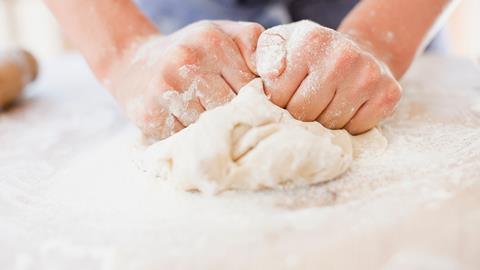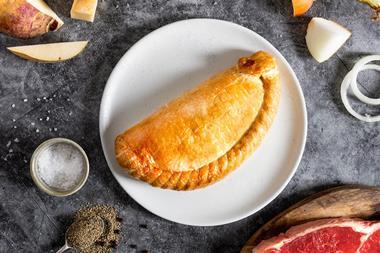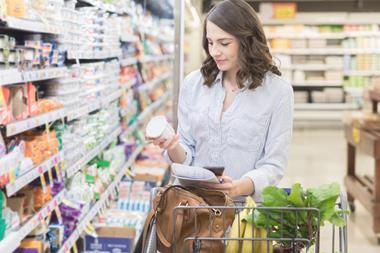Lockdowns saw Brits turn to baking, with cupcakes, sourdough and banana bread the big winners. So with shoppers turning to online recipes and social media for inspiration, which behaviours are here to stay? And how can brands capitalise on these trends?
This research was commissioned by The Grocer and carried out by Lumina Intelligence independently from Maple From Canada UK
Free download: 10 charts explaining UK attitudes to home baking
1. Half of Brits bake at home at least once a week
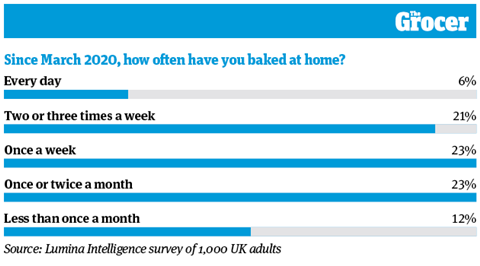
Lockdown fuelled a baking resurgence. So it’s no surprise that half of Brits say they have baked at home at least once a week since the first national lockdown hit last March. A total of 27% are baking more than once a week, according to our survey of 1,000 UK adults conducted by Lumina Intelligence. That’s up from 19% prior to the pandemic.
But behaviours are unlikely to simply go back to normal as lockdown lifts and Brits are able to venture further outside their homes. It looks as though the pandemic has created a permanent shift in baking habits, with 56% of respondents agreeing or strongly agreeing that they will bake more in the future as a result of lockdown.
2. Cupcakes were the most popular item during lockdown
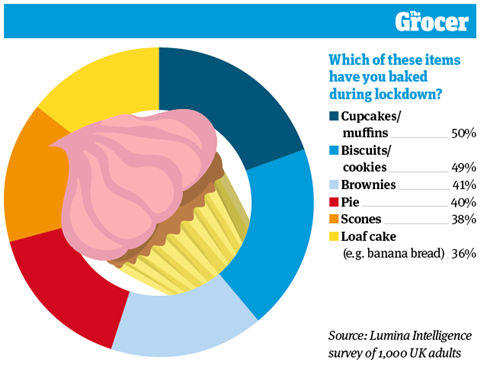
Banana bread was the talk of lockdown. However, it was far from the most-baked item. Loaf cakes such as banana bread were only the sixth most popular among Brits, who were more likely to have been whipping up brownies, pies and scones.
Biscuits and cupcakes topped the list across all age groups except for the over-65s, who were most likely to bake scones.
Mylène Denicolai, director of promotions at Maple From Canada UK, says there was a reason for the popularity of these items. “Home bakers generally opted for family-friendly items of comfort and nostalgia which are easy to make”, she explains, and cupcakes were simple enough for “people from all baking levels” to attempt.
3. Millennials baked the most sourdough loaves
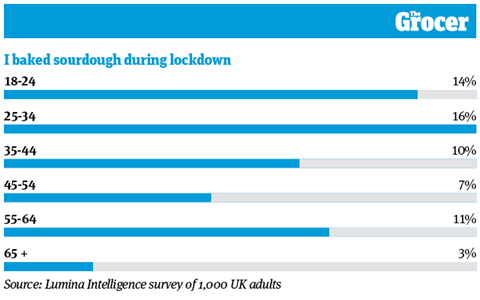
It may be a cliché, but it turns out millennials really do love sourdough. As our survey shows, 25 to 34-year-olds baked the speciality bread the most during lockdown, followed by the 18 to 24-year-old demographic.
That said, sourdough was not just limited to the younger generations: although only 3% of the 65-plus age group baked it, 11% of 55 to 64-year-olds said they tried their hand.
People in the youngest age brackets were also most likely to have learned the art of sourdough baking as a result of the pandemic. When asked if they had learned a new baking skill during lockdown, 62% of 18 to 24-year-olds agreed, as did 56% of those aged 25 to 34, compared with 18% of over-65s.
4. Most banana bread was baked in London and the south east
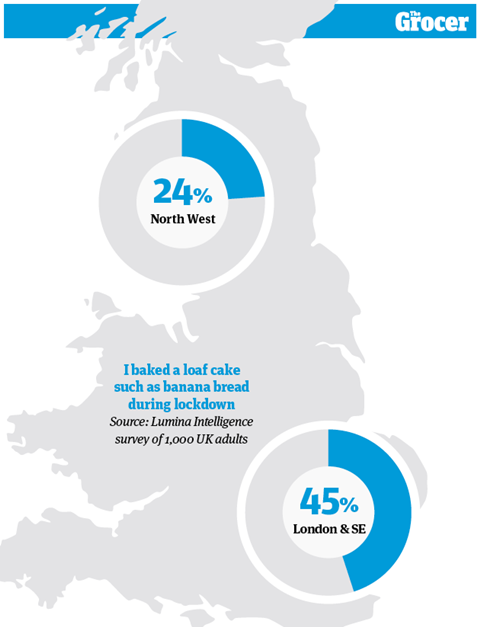
You could hardly escape the hype around banana bread during 2020, as Brits took to the simplicity of the recipe. “Banana bread is easy to make, it uses ingredients like bananas past their use-by date and it’s a great comfort food,” says Maple From Canada UK’s Denicolai.
But its popularity did vary by region. Loaf cakes were most popular in London and the south east of England, where 45% of respondents baked them. That compared with less than a quarter in the north west.
There was a gender split here, too. More than four in 10 women said they had baked a loaf cake such as banana bread in the pandemic, compared with just 28% of men.
5. More than half of Brits started baking due to more free time
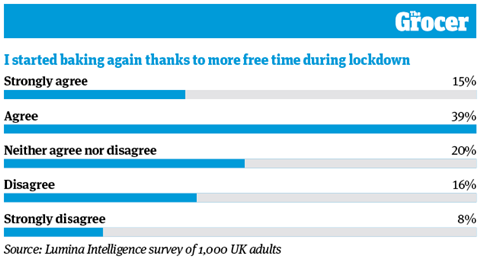
Gardening, Zoom quizzes, TikTok dances… Brits tried just about everything to beat the boredom during their months in lockdown. So it’s no surprise that boredom was a motivation behind the uptick in baking too, with 54% of people saying they returned to the hobby thanks to more free time.
But according to Maple From Canada UK’s Denicolai, that wasn’t the only reason. She believes many “turned to baking as an educational and family-friendly pastime, while others saw it as a way to reduce stress”.
That half of people are still baking at least weekly (see chart one) is a positive sign, says Denicolai, who believes there is “longevity” in the trend.
6. The majority of Brits look for baking recipes online
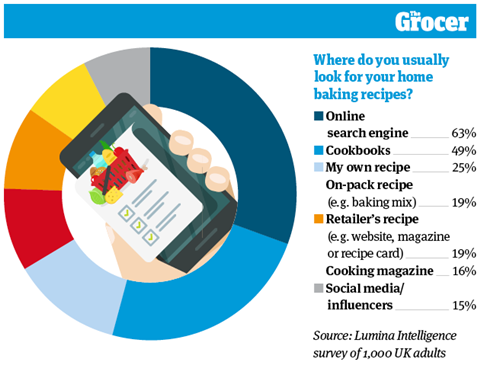
Alongside cake tins, piping bags and wooden spoons, the internet has proven another important baking utensil for Brits. A total of 63% of respondents named online search engines as their most popular source of recipes. Search engines were most popular with 35 to 44-year-olds (76%), while the over-65s were least likely to use them (40%). The most popular resource for this age group was cookbooks, favoured by 61%.
However, this preference wasn’t limited to older bakers. People across all age groups still seek offline inspiration, via cookbooks (49%), their own recipes (25%) and on packaging from baking mixes (19%). Social media was the least popular source, but over-indexes with younger Brits (see below).
7. Young bakers are most likely to use social media for inspiration
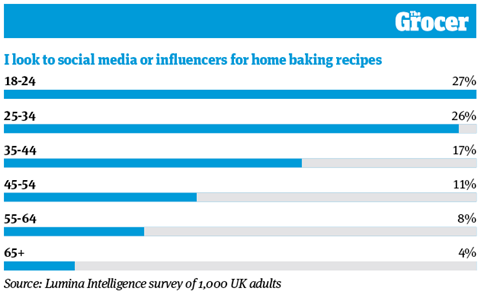
Social media may not be a major source of baking inspiration, but it does punch above its weight with younger consumers. That’s according to our data, which shows 27% of 18-24-year-olds look to social media or influencers for recipes. This percentage falls with age, down to just 4% of over-65s.
When asked how likely they would be to bake a recipe shared by an influencer they like, consumers showed the same pattern: 57% of 18-24-year-olds agreed, compared with 21% of over 65s. Denicolai believes the enthusiasm among the youngest group could be partly down to the rise of TikTok, “which has done well to engage younger bakers through inspiring new food trends and creative ideas”.
8. YouTube is the top social media channel for baking recipes
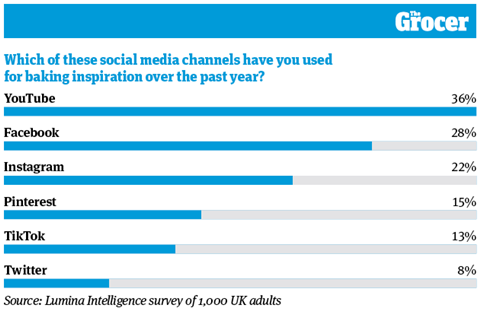
YouTube emerged as the preferred social media channel for Brits in need of baking inspiration in our research, with 36% of people using it over the past year. This preference for YouTube was unanimous across all age groups bar the over-65s, where it came in second to Facebook.
Denicolai isn’t surprised at this result: she believes YouTube is an “attractive companion in the kitchen” due to its use by many celebrity chefs and influencers.
On top of this, it provides reassurance to novice bakers “in a way traditional cookbooks cannot”, she says. “Seeing every step of the process helps settle some of the unease beginners might feel when reading a recipe.”
9. Sugar-free baking is more popular than vegan
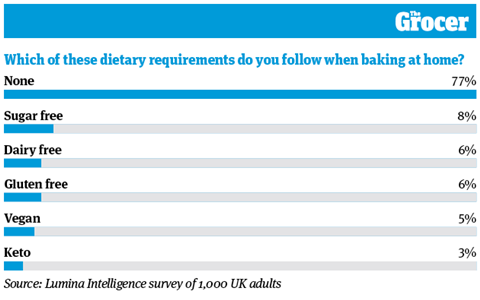
Brits are generally free and easy with their baking. That’s shown by the 77% who don’t follow any dietary requirements when whipping up their latest creation. And if they do omit anything, it’s not what you think.
Despite the rise in plant-based eating, only 5% of Brits go totally vegan when baking at home, and 6% go dairy-free. Likewise, 6% of consumers bake without gluten.
Sugar-free was the most popular stipulation when baking, chosen by 8% of respondents. Maple From Canada’s Denicolai believes this is because “sugar has, in recent years, become somewhat of a dietary evil with consumers”.
That doesn’t mean they are likely to cut out sugar altogether, though. “People still wish to indulge in a sweet treat,” she says.
10. Four in 10 Brits think home baked items are healthier than shop-bought
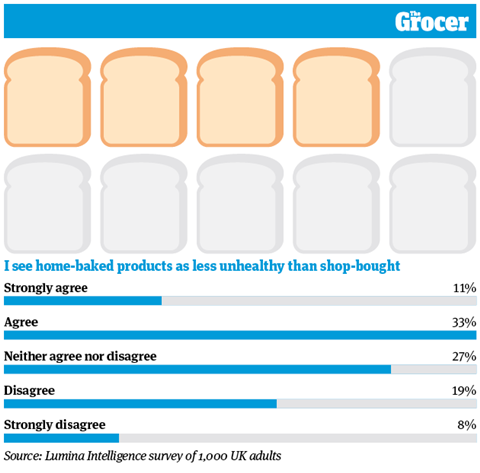
We’ve all been in need of a treat over the past year. This mindset seems to have fed into the eating habits of Brits, 37% of whom say they don’t consider the health implications when baking at home.
When faced with the statement ‘I try to only bake healthy items’, more consumers disagreed (43%) than agreed (24%).
That’s probably because enjoyment is such a key driver of baking. The majority of consumers also said this was their main reason for baking (62%) as opposed to necessity, such as baking their daily bread or part of a meal (17%).
This is backed up by the general preference for sweet versus savoury: 39% said they preferred baking sweet items, compared with 19% who chose savoury and 29% who baked an equal amount of each.
However, there is still a health angle on the home baking trend. Nearly half of respondents (45%) thought home-baked goods were healthier than shop-bought alternatives. And 11% strongly agreed with that statement.
By contrast, only a quarter of respondents to our survey disagreed there was any health benefit to baking at home versus buying from a shop.
Downloads
10 Charts Home Baking
PDF, Size 0.32 mb







